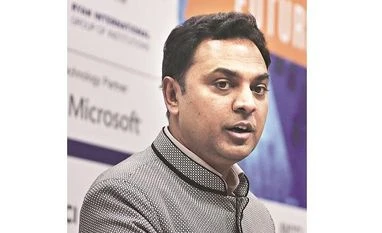Chief Economic Adviser K V Subramanian said on Friday that India Inc needs to respond to various reform measures, including those in the labour sector, undertaken by the government to accelerate the growth impacted by the Coronavirus (Covid-19) pandemic.
“India Inc needs to actually respond. We've enabled the labour laws and the reforms, etc. I think that is a sentiment I would really like a lot of you to reflect upon,” said Subramanian, at a virtual event organised by industry body FICCI. “There are enough opportunities for ethical wealth creation to be done in the Indian context. This is something that I would like to see widespread in India Inc.”
He said that India is the only country which utilised the opportunity provided by the current crisis to unleash the second generation reforms that are focused on factor markets.
He said that looking at the reforms that have happened since 1991, most of those reforms were primarily focused on product markets. These include the reforms that were launched by the Atal Bihari Vajpayee government as well.
But now, looking at the reforms that have been launched together with some of the previous ones, like IBC (Insolvency and Bankruptcy Code), he said they are basically an attempt to reform the capital. He said there are labour reforms and the cost of labour is an important factor of production. He said agriculture is another important factor in the primary sector.
"When you take these into account, there is a very important theme of Aatmanirbhar Bharat,” said Subramanian. “This is primarily about relying on the private sector enterprise and on the efficiency that the private sector brings,” he said.
Subramanian said these reforms signal that the intent of this government is to rely on markets. These also signal that efficiency is primarily brought in by the private sector. He said there is a big signal from the government about its willingness to do what is economically right.
He said that the idea of ‘Aatmanirbhar Bharat’ is not anathema to competition and it is actually about how to coexist with the competition.
Subramanian also said that the Covid-19 pandemic now illustrates that factories can be set up in hinterlands and can be managed virtually. “Labour cost would be much lower,” he said.
Chetan Krishnaswamy, vice-president for public policy at Amazon India, who was at the virtual event, focused on the e-commerce initiatives related to Aatmanirbhar Bharat. He said that there is a need for corporate boardrooms, to take note of the tremendous amount of energy that exists in rural India and the hinterlands. He said that out of 650,000 sellers on Amazon's marketplace, close to 50 per cent come from the tier-2 and tier-3 towns and cities.
Adarsh Menon, senior vice president and head - Flipkart Wholesale and Walmart India, who was also at the event said the pandemic has definitely brought to light the effect of digital companies to innovate and respond with great agility to solve unique local challenges.
“Flipkart’s push towards digital commerce, we believe, is a key catalyst and partner for MSMEs, because the technology and these digital tools will actually help them tap into both domestic as well as global supply chains,” said Menon. He said that Flipkart Wholesale is built on the core value proposition of bringing prosperity to Indian kiranas and SMEs. He said that the company sources fashion products from MSMEs all across the country. Referring to a study by tech firm Cisco, he said Indian SMEs are likely to add $158-$216 billion to the country’s gross domestic product (GDP) in the coming four years on the back digitalization of their businesses,
“If we aid MSMEs to expand into supply chains, this will increase their resilience, and also help realize our dream of a self-reliant or Aatmanirbhar Bharat,” said Menon.
Amazon's Krishnaswamy said that Amazon unveiled its Global Selling Programme in India in May 2015. It had clocked more than $1 billion dollars in cumulative exports. The platform is expected to generate $10 billion in cumulative export sales by 2025 for Indian exporters enrolled in this programme.
“We have about 60,000 SMEs that export to 200 countries,” said Krishnaswamy.
Amazon has planned to create 1 million jobs in India by 2025 and to digitise over 10 million small businesses in India.
Unlock 30+ premium stories daily hand-picked by our editors, across devices on browser and app.
Pick your 5 favourite companies, get a daily email with all news updates on them.
Full access to our intuitive epaper - clip, save, share articles from any device; newspaper archives from 2006.
Preferential invites to Business Standard events.
Curated newsletters on markets, personal finance, policy & politics, start-ups, technology, and more.
)